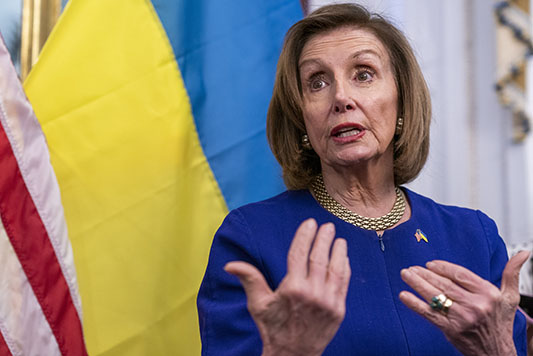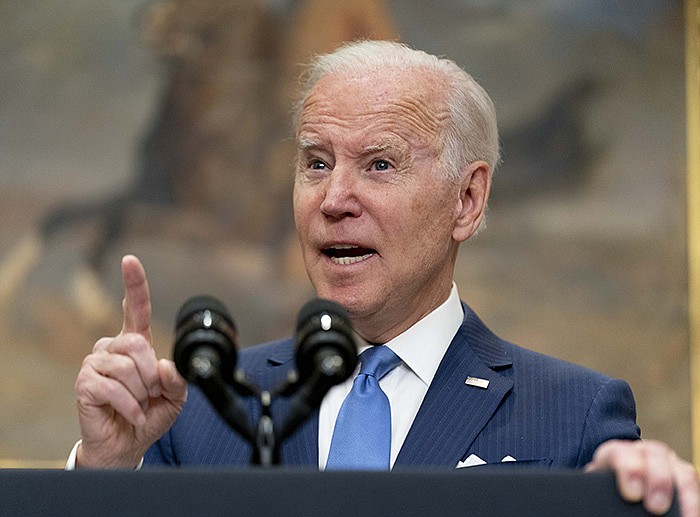WASHINGTON — President Joe Biden called on Congress on Thursday to approve $33 billion in additional aid for Ukraine, arguing that American weapons and humanitarian assistance are helping to beat back Russian invaders in a conflict with consequences for the United States and the rest of the world.
“The cost of this fight is not cheap,” he said in a statement made at the White House, addressing domestic concerns about the expense. “But caving to aggression is going to be more costly if we allow it to happen.” “We either back the Ukrainian people as they defend their country or we stand by as the Russians continue their atrocities and aggression in Ukraine,” he added.
The aid package would eclipse all the spending by the United States so far on the war and ramp up the United States’ investment not just in Ukraine’s defense but, more broadly, in weakening Russian military capacity, a goal outlined in recent days by Defense Secretary Lloyd Austin.
There is broad bipartisan support on Capitol Hill for more aid but it remained uncertain whether the issue could get tied up in negotiations over ancillary issues such as covid relief or immigration.
While Biden’s letter to Congress endorsed tying the Ukraine aid to a separate $22.5 billion pandemic response package, he told reporters he did not really care whether the two measures were linked or passed separately as long as both were approved.
The president also said he is sending lawmakers a legislative plan to make it easier to seize the assets of Russian oligarchs tied to President Vladimir Putin and direct some of those resources to the Ukrainians.
The House passed a mostly symbolic bill Wednesday urging Biden to liquidate assets worth more than $5 million belonging to those targeted by U.S. sanctions and send the proceeds to Ukraine. It went through with bipartisan support in a 417-8 vote. A similar Senate proposal has backing from Sens. Sheldon Whitehouse, D-R.I.; Richard Blumenthal, D-Conn.; Lindsey Graham, R-S.C.; and Roger Wicker, R-Miss.
An earlier version of the House bill would have gone further, giving the president the direct authority to liquidate the assets, but it was dissolved after the American Civil Liberties Union warned it could run afoul of the Constitution’s due-process protections because it did not allow its targets to challenge the government’s actions in court.
ACLU officials said the measure probably would have been struck down by the courts, giving Russia a potential propaganda victory over the United States. The House bill says the funds should be used for weapons for Ukraine’s military, the country’s reconstruction, humanitarian aid for refugees and assistance for the Russian people.
“The question is where the jurisdiction is, and do these oligarchs have standing to protect their property?” said Ariel Cohen, a senior fellow at the Atlantic Council Eurasia Center and a member of the Council on Foreign Relations. “I’m not necessarily in favor of property being seized without due process. … What is the source of law to seize, let alone dispose, of these assets?” On a call with reporters, a senior administration official declined to offer specifics but said the new measures would include mechanisms for judicial review.
“With those safeguards, we feel confident it does provide constitutional requirements,” said the official said.
Biden said he will travel to Alabama next week to visit a factory that makes Javelin anti-tank missiles that have been sent to Ukraine, a way of showing Americans that they have an economic stake in the war.
Responding to nuclear saber-rattling by Russian officials in recent days, the president said it was “irresponsible” to make such threats and he rejected Moscow’s claims that Ukraine has become a proxy war between Russia and NATO.
“They’re not true,” Biden said. “They do concern me because it shows the desperation that Russia is feeling about their abject failure in being able to do what they set outto do. And so I think it’s more of a reflection not of the truth but of their failure.” The emergency aid request, more than twice the size of the $13.6 billion package lawmakers approved and Biden signed last month, underscores how the United States and its allies are preparing for a sustained conflict in Ukraine, and bracing for global economic and political consequences.
PACKAGE PARTICULARS
“The cost of failing to stand up to violent aggression in Europe has always been higher than the cost of standing firm against such attacks,” Biden wrote in a letter accompanying the request. “That is as it always has been, and as it always will be. America must meet this moment, and do its part.” An administration official who detailed the package before its official release said the funding is projected to last for at least five months.
It includes more than $20 billion for security and military assistance, including $11.4 billion to fund equipment and replenish stocks already provided to Ukraine, $2.6 billion to support the deployment of U.S. troops and equipment to the region, and $1.9 billion for cybersecurity and intelligence support.
The request also includes $8.5 billion in economic assistance for the government in Kyiv to provide basic economic support, including food and health care services, as the Ukrainian economy suffers from the toll of the war. An additional $3 billion would be provided for humanitarian assistance and food security funding, including medical supplies and support for Ukrainian refugees and to help stem the impact of the disrupted food supply chain.
Lawmakers in both parties have voiced support for another round of emergency aid for Ukraine, having approved more money in March than what the administration initially requested at the time.
RETOOLING LEND-LEASE
The U.S. House gave final passage Thursday to legislation that would streamline a World War II-era military lend-lease program to more quickly provide Ukraine and other Eastern European countries with American equipment to fight the Russian invasion.
The measure, which passed by an overwhelming 417-10 vote, now goes to the White House for Biden to sign into law.
House Foreign Affairs Committee Chairman Gregory Meeks of New York said with unified support from the U.S. Congress, “Ukraine will win.” The bill is the latest from Congress, which is steadily churning out resolutions and resources to counter Putin’s invasion of Ukraine and help the country and its President Volodymyr Zelenskyy fight back.
Months in the making, the bipartisan bill was first introduced in January as part of the U.S.’ posture of deterrence to warn off Putin’s aggression towards Ukraine.
The measure would update the 1941 legislation Franklin D. Roosevelt signed into law to help allies fight Nazi Germany. At the time, the then-U.S. president ushered the Lend-Lease Act through Congress, responding to British Prime Minister Winston Churchill’s appeal for aid, even as America initially remained neutral in the war, according to the U.S. National Archives.
Biden is expected to sign the bill into law, giving the administration greater leeway to send military equipment to Ukraine and neighboring allies in Eastern Europe.
“It is a real moment in history that we are back on this House floor supporting lend-lease,” said Rep. French Hill, R-Ark.
The congressman said he hoped the “Churchillian idea” would end delays in shipping aid to Ukraine, much the way the original law sped help to Britain fighting Adolf Hitler’s Germany in World War II.
“Today we find ourselves in a very similar situation with Putin systematically bombing and shelling the peaceful villages and cities of Ukraine,” he said.
Speaker Nancy Pelosi also gave nod to the moment, saying the war is a battle between democracy and autocracy, and echoed Roosevelt’s call on Americans to provide the fuel to keep light of democracy burning.
“Our task today remains the same,” she said. “The Ukrainian people are making the fight for all of us.” Zelenskyy has repeatedly pleaded for more military equipment from the U.S. and allies, on top of the Stinger and Javelin missile systems, lethal drones and other weaponry that has already been flowing to the region.
Lawmakers in both parties, Republicans and Democrats, have argued that the U.S. is not moving swiftly enough to help the Ukrainians. Members of Congress have trekked to the region to see first-hand the devastation, meet with their counterparts in Ukraine and do what they can to offer help with resettling the flood of more than 5 million refugees.
The measure approved by the U.S. Congress would update the 1941 law specifically for the Ukrainian conflict, lifting some reimbursement requirements and allowing military equipment to be lent or leased for more than five years.
While the updated legislation had backing from both parties in the House and Senate, it stalled in Congress along with other Ukraine-focused bills. Democratic lawmakers tended to defer to the president of their party to take the lead on foreign policy, especially as Biden worked to build support from allies abroad.
Then the Senate quietly approved the bill from Sen. Ben Cardin, D-Md., and Sen. John Cornyn, R-Texas, earlier this month on a voice vote without objections.
This week, the House pushed it forward on the chamber’s agenda as soon as lawmakers returned from a spring recess.
But the House debate devolved. Republicans initially focused instead on immigration issues at the U.S. Southern border with Mexico, leading some Democrats to blame the House GOP for harboring pro-Donald Trump factions soft on Putin.
“We stand for democracy here, not Vladimir Putin,” said Rep. Jamie Raskin, D-Md., wearing a blue-and-yellow tie, the colors of the Ukraine flag, during a floor debate.
Raskin criticized GOP Rep. Marjorie Taylor-Greene of Georgia for her earlier comments disparaging NATO and Western support for Ukraine. He questioned why she joined the debate to talk about immigration at the Southern border rather than the Russian invasion.
Rep. Guy Reschenthaler, R-Pa., who was managing the early part of the floor debate, insisted the “vast majority of my colleagues” support the lend-lease bill and would see it to passage.
Information for this article was contributed by Peter Baker and Emily Cochrane of The New York Times; John Hudson, Dan Lamothe, Timothy Bella, Spencer S. Hsu, Devlin Barrett, Sammy Westfall, Annabelle Timsit, Anthony Faiola, David L. Stern, Andrew Jeong, Matt Viser, Missy Ryan, Bryan Pietsch and Jeff Stein of The Washington Post; and Lisa Mascaro of The Associated Press.
 House Speaker Nancy Pelosi speaks Thursday at the Capitol at the unveiling of a photograph exhibit on the war in Ukraine. The House gave final passage to a bill to streamline a World War IIera military lend-lease program to speed the flow of U.S. equipment to Ukraine and other Eastern European countries. (AP/Jacquelyn Martin)
House Speaker Nancy Pelosi speaks Thursday at the Capitol at the unveiling of a photograph exhibit on the war in Ukraine. The House gave final passage to a bill to streamline a World War IIera military lend-lease program to speed the flow of U.S. equipment to Ukraine and other Eastern European countries. (AP/Jacquelyn Martin)
